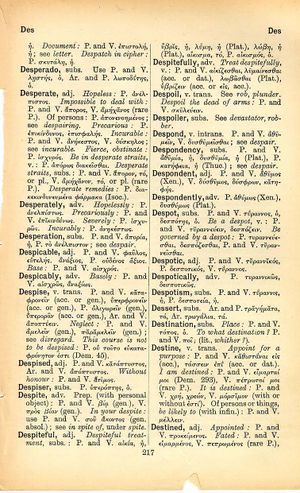destine: Difference between revisions
From LSJ
ἑτέρως ἠδύνατο βέλτιον ἢ ὡς νῦν ἔχει κατεσκευάσθαι → otherwise they could have been constructed better than they are now (Galen, On the use of parts of the body 4.143.1 Kühn)
(Woodhouse 2) |
(CSV3) |
||
| Line 1: | Line 1: | ||
{{ | {{Woodhouse1 | ||
| | |Text=[[File:woodhouse_217.jpg|thumb|link={{filepath:woodhouse_217.jpg}}]]'''v. trans.''' | ||
<b class="b2">Appoint for a purpose</b>: P. and V. καθιστάναι εἰς (acc.), τάσσειν ἐπί (acc. <b class="b2">cr</b> dat.). | |||
<b class="b2">I am destined</b>: P. and V. εἵμαρταί μοι (Dem. 293), V. πέπρωταί μοι (rare P.). | |||
<b class="b2">It is destined</b>: P. and V. χρή, [[χρεών]], V. μόρσιμον (with or without ἐστί). | |||
Of persons or things, <b class="b2">be likely to</b> (with infin.): P. and V. μέλλειν. | |||
}} | }} | ||
Revision as of 09:27, 21 July 2017
English > Greek (Woodhouse)
v. trans.
Appoint for a purpose: P. and V. καθιστάναι εἰς (acc.), τάσσειν ἐπί (acc. cr dat.).
I am destined: P. and V. εἵμαρταί μοι (Dem. 293), V. πέπρωταί μοι (rare P.).
It is destined: P. and V. χρή, χρεών, V. μόρσιμον (with or without ἐστί).
Of persons or things, be likely to (with infin.): P. and V. μέλλειν.

